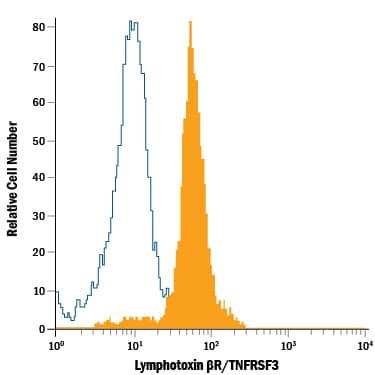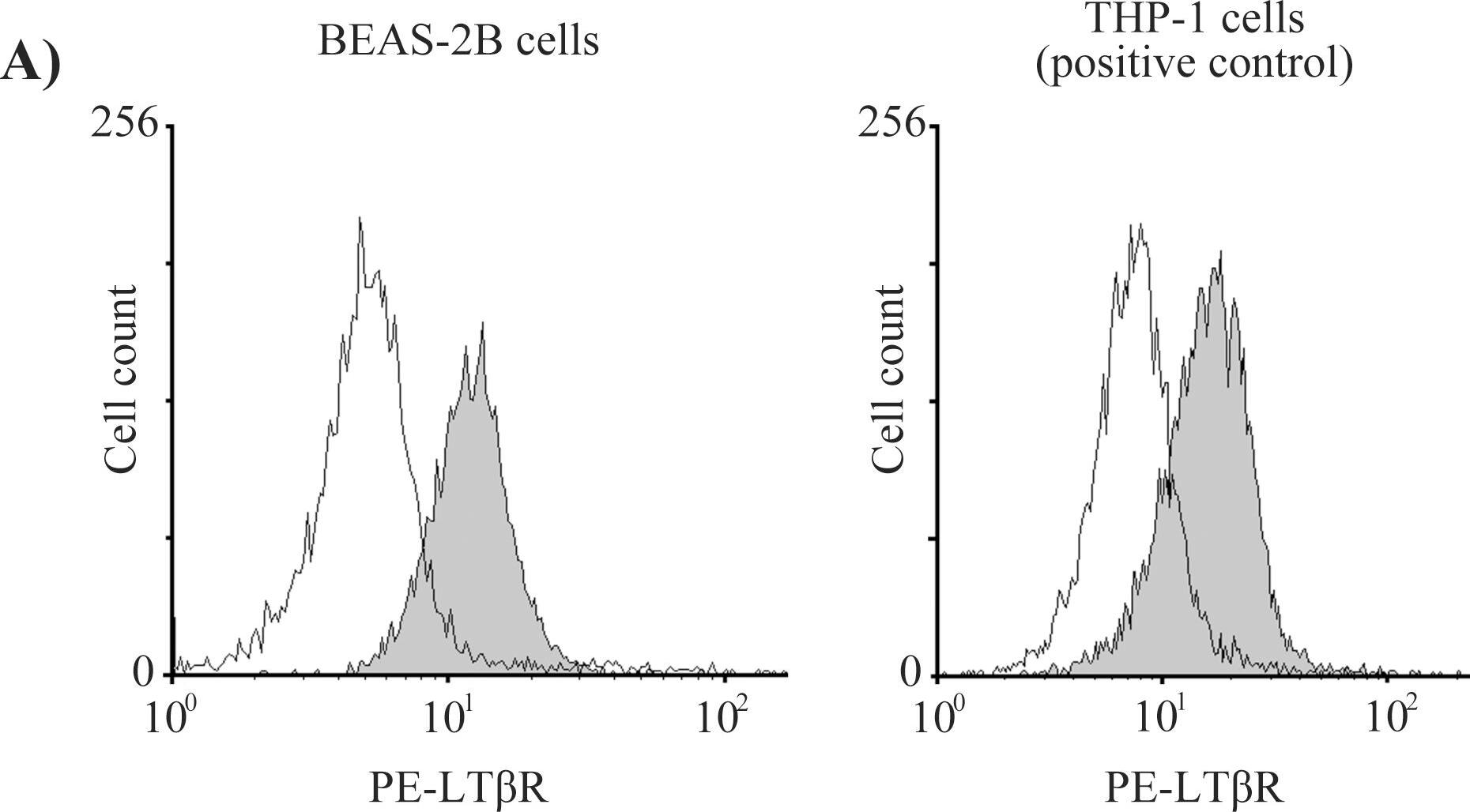Human Lymphotoxin betaR/TNFRSF3 PE-conjugated Antibody
R&D Systems, part of Bio-Techne | Catalog # FAB629P


Key Product Details
Validated by
Species Reactivity
Validated:
Cited:
Applications
Validated:
Cited:
Label
Antibody Source
Product Specifications
Immunogen
Gln31-Met227
Accession # P36941
Specificity
Clonality
Host
Isotype
Scientific Data Images for Human Lymphotoxin betaR/TNFRSF3 PE-conjugated Antibody
Detection of Lymphotoxin betaR/TNFRSF3 in Human Blood Monocytes by Flow Cytometry.
Human peripheral blood monocytes were stained with Mouse Anti-Human Lymphotoxin betaR/TNFRSF3 PE-conjugated Monoclonal Antibody (Catalog # FAB629P, filled histogram) or isotype control antibody (Catalog # IC002P, open histogram). View our protocol for Staining Membrane-associated Proteins.Detection of Human Lymphotoxin beta R/TNFRSF3 by Flow Cytometry
Expression of LT betaR and HVEM receptors on BEAS-2B cells.BEAS-2B cells and THP-1 cells (positive control) were treated with anti-PE labeled LT betaR antibody and anti-FITC labeled HVEM antibody. The fluorescence intensity was measured with a flow cytometer. THP-1 cells, a human monocytic cell line, were used as the positive control because they express both LT betaR and HVEM on their cell surface. The fluorescence intensities of LT betaR (A) and HVEM (B) suggest that BEAS-2B cells express LT betaR but not HVEM. Image collected and cropped by CiteAb from the following publication (https://pubmed.ncbi.nlm.nih.gov/25501580), licensed under a CC-BY license. Not internally tested by R&D Systems.Applications for Human Lymphotoxin betaR/TNFRSF3 PE-conjugated Antibody
Flow Cytometry
Sample: Human peripheral blood monocytes
Formulation, Preparation, and Storage
Purification
Formulation
Shipping
Stability & Storage
- 12 months from date of receipt, 2 to 8 °C as supplied.
Background: Lymphotoxin beta R/TNFRSF3
Lymphotoxin beta Receptor (LT betaR), also known as TNF RIII and TNF R-Related Protein (TNF Rrp) is a member of the TNF receptor superfamily, designated TNFRSF3. Human LT betaR cDNA encodes a 435 amino acid (aa) residue type I membrane protein with a putative 30 aa residue signal peptide, a 193 aa residue extracellular domain and a 171 aa residue cytoplasmic domain. The extracellular domain of LT betaR contains four cysteine-rich motifs characteristic of the TNF receptor superfamily. The cytoplasmic region of LT betaR shares little sequence similarity with other TNF receptor family members, suggesting that different signaling mechanisms may be used. LT betaR is expressed in a variety of tissues including visceral and lymphoid tissues. LT betaR is also expressed by cell lines of monocytic, epithelial, and fibroblastic origins but not by T and B lymphocytes. Human and mouse LT betaR share 76% aa sequence homology. The TNF family ligands that have been shown to bind and activate LT betaR include LIGHT (also a ligand for HVEM) and the heterotrimeric Lymphotoxin LT alpha1/ beta2 or LT alpha2/ beta1. Depending on the cell type, activation of LT betaR has been shown to induce NF kappaB activation, chemokine production, growth arrest, and apoptosis. In vivo, LT betaR has been shown to play a critical role in controlling cellular immune functions and lymphoid organogenesis.
References
- Zhai, Y. et al. (1998) J. Clin. Invest. 102:1142.
- Rennert, P.D. et al. (1998) Immunity 9:71.
- Degli-Esposti, M.A. et al. (1997) J. Immunol 158:1756.
- Mackay, F. et al. (1996) J. Biol. Chem. 271:8618.
- Crowe, P.D. et al. (1994) Science 264:707.
Long Name
Alternate Names
Entrez Gene IDs
Gene Symbol
UniProt
Additional Lymphotoxin beta R/TNFRSF3 Products
Product Documents for Human Lymphotoxin betaR/TNFRSF3 PE-conjugated Antibody
Product Specific Notices for Human Lymphotoxin betaR/TNFRSF3 PE-conjugated Antibody
For research use only
